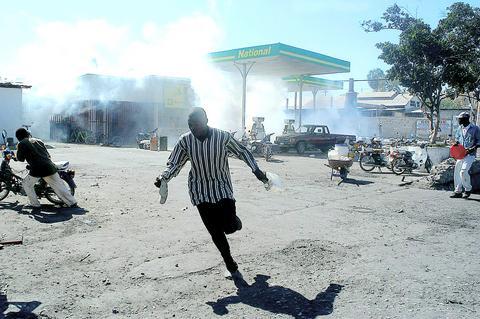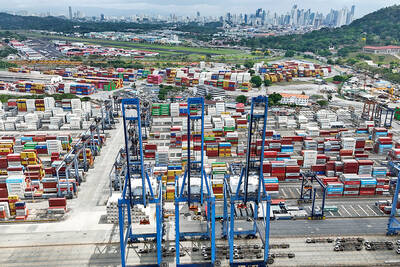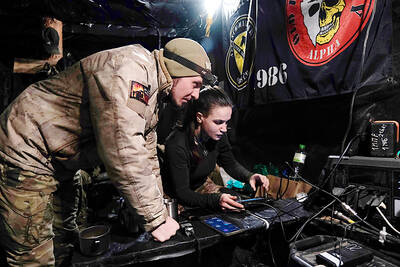Smoldering human remains littered the city streets as Haitian President Jean-Bertrand Aristide vowed to serve out the rest of his term and condemned an armed uprising that has left at least 47 dead and weakened his hold on the presidency.
Wearing stolen police helmets and carrying looted weapons, rebels patrolled the streets of Gonaives on Wednesday in a search for detractors and government supporters. One accused government hitman was doused with gasoline and set ablaze while another was shot to death.
"I will leave the palace Feb. 7, 2006," Aristide told reporters Wednesday in the first news conference since the uprising began a week ago, skirting the issue of how he planned to put down the insurrection. His officials have said to prevent civilian casualties, any counterattacks must be part of a strategy that could take time to plan.

PHOTO: AFP
In the port city of St. Marc, south of Gonaives, police on Wednesday attacked rebels holed up while gunmen loyal to Aristide torched homes. Photographers saw three dead bodies with bullet wounds to their heads. Witnesses said were anti-Aristide activists.
Aristide's government was due to be tested yesterday when the Democratic Platform, a broad coalition that has distanced itself from the bloody revolt, has called for a massive demonstration for Haitians to show Aristide they no longer want his leadership.
"They suffer from a small group of thugs linked to the opposition ... acting on behalf of the opposition," Aristide said in the capital of Port-au-Prince on Wednesday.
The same rebels who began the uprising say they were once armed by Aristide's government.
The uprising exploded in Gonaives when rebels attacked the police station, torching it and the mayor's house. Winter Etienne, one of several leaders of the rebel Gonaives Resistance Front, said the police station was attacked in response to the killing of five government opponents that day by Aristide loyalists.
"We already have a force hiding in St. Marc, and we also have one hiding in Cap-Haitien. They are awaiting the orders to attack," Etienne said.
In northern Cap-Haitien, attackers looted a food warehouse and pro-Aristide militants set up blazing barricades to protect Haiti's second-largest city. He said the city's residents had backed him to be the new mayor, with other rebel leaders filling in top positions.
The World Food Program reported a looming humanitarian crisis in the north with food delivery trucks unable to make stops because of the barricades. Sporadic electric outages were also reported in Cap-Haitien, which relies on fuel deliveries to power electric generators.
The Gonaives courthouse stood deserted in Gonaives on Wednesday. Government offices were closed. Hospitals were understaffed. Supplies were running low and food prices have risen in Haiti's fourth-largest city because barricades have blocked deliveries.
At a gas station where a scuffle broke out over the last dregs of gasoline, rebels thrust their rifles high in the air and shouted "Get in line! Don't push!"
People with sledgehammers smashed the charred remains of the police station.
Haiti has suffered more than 30 coups in 200 years, the last in 1991 when Aristide was ousted just months after becoming the Caribbean nation's first freely elected leader. Then-US president Bill Clinton sent 20,000 US troops in 1994 to end a military dictatorship, restore Aristide and halt an exodus of Haitian boat people.
US officials say they now are on alert against any new exodus set off by the uprising.
"We are extremely concerned about the wave of violence spreading through Haiti," Scott McClellan, press secretary to US President George W. Bush, said in Washington "We call on the government to respect the rights, especially human rights, of the citizens."
Such comments have angered Haitian officials who note that Washington has not denounced the rebels.

THE TRAGEDY OF PUNCH: Footage of the seven-month-old Japanese macaque has gone viral online after he was rejected by his mother and formed a bond with a soft toy A baby monkey in Japan has captured hearts around the world after videos of him being bullied by other monkeys and rejected by his mother went viral last week. Punch, a Japanese macaque, was born in July last year at Ichikawa City Zoo. He has drawn international attention after zookeepers gave him a stuffed orangutan toy after he was abandoned by his mother. Without maternal guidance to help him integrate, Punch has turned to the toy for comfort. He has been filmed multiple times being dragged and chased by older Japanese macaques inside the enclosure. Early clips showed him wandering alone with

Australian Prime Minister Anthony Albanese yesterday said he did not take his security for granted, after he was evacuated from his residence for several hours following a bomb threat sent to a Chinese dance group. Albanese was evacuated from his Canberra residence late on Tuesday following the threat, and returned a few hours later after nothing suspicious was found. The bomb scare was among several e-mails threatening Albanese sent to a representative of Shen Yun, a classical Chinese dance troupe banned in China that is due to perform in Australia this month, a spokesperson for the group said in a statement. The e-mail

‘OCCUPATION’: Hong Kong said it had lodged ‘stern protests’ with Panama’s consulate, and would ‘staunchly support’ the rights and interests of Hong Kong companies Panamanian President Jose Raul Mulino on Monday ordered the temporary occupation of two ports run by a unit of CK Hutchison Holdings Ltd following the Supreme Court’s ruling against the firm’s concession, escalating a dispute that has become a proxy battle between the US and China in Latin America. Mulino said in a speech that the administration and operation of the two ports on the strategic Panama Canal is to revert to the country’s National Maritime Authority to ensure their uninterrupted, safe and efficient operation. The occupation covers movable equipment at the ports and does not mean a definitive loss of

GAME CHANGER The Russian invasion of Ukraine has shown the utility of small drones for recon, for supporting logistics and for killing across the modern battlefield Five European nations have announced a new program to produce low-cost air defense systems and autonomous drones using Ukrainian expertise, hard-won over the past four years fighting against Russia. Friday’s initiative of the five nations — France, Poland, Germany, the UK and Italy — comes as one of many European efforts to bolster defense along their borders, like a “drone wall ” with Russia and Ukraine to better detect, track and intercept drones violating Europe’s airspace. Both Moscow and Kyiv have cutting-edge drone warfare capabilities forged in the grim laboratory of war where battlefield innovations have rewritten modern battle tactics. Poland is